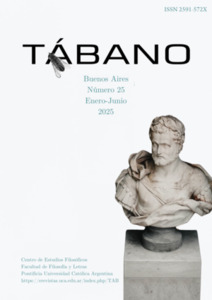Por favor, use este identificador para citar o enlazar este ítem:
https://repositorio.uca.edu.ar/handle/123456789/19486| Título: | Gilles Deleuze: Esquizo-análisis vs. Materialismo Dialéctico. Parte I. Salvajes, Bárbaros y Civilizados: ¿procesos dialécticos o procesos maquínicos? Gilles Deleuze: Schizo-analysis vs. Dialectical Materialism. Part I. Savages, Barbarians and Civilized: dialectical processes or machinic processes? |
Autor: | Chicolino, Martín | Palabras clave: | FILOSOFIA MORAL; PATRIARCADO; VIOLENCIA DE GENERO; PROSTITUCION; PSICOANALISIS; MATERIALISMO DIALECTICO; Deleuze, Gilles, 1925-1995 | Fecha de publicación: | 2025 | Editorial: | Pontificia Universidad Católica Argentina. Facultad de Filosofía y Letras. Centro de Estudiantes de Filosofía | Resumen: | El presente estudio monográfico (que se divide en dos artículos que serán publicados consecutivamente en esta revista) está dedicado a estudiar la manera en que Gilles Deleuze abordó el problema psico-político de la dominación y de la violencia psico-sexo-política masculina. Para ello, será necesario partir de la pregunta que interroga acerca de la relación genética que el Patriarcado (en tanto que mega-red de relaciones de alianzas masculinas de sexo-poder) guarda con el Estado (en tanto que forma de organizar la sociabilidad humana) y con el Capitalismo (en tanto que modo de organizar la productividad humana). Con respecto a dicha relación genética, Deleuze postulará, siguiendo al sinólogo marxista Ferenc Tökei, que ‘esclavo liberto’ (antepasado del proletario moderno) fue la personificación social masculina clave en la génesis patriarcal del Capitalismo por el Estado, siendo la explotación psico-sexual de las mujeres (prostitución) una empresa de primer orden para la comprensión de dicha génesis. Según el Esquizoanálisis, la explotación psico-sexual y libidinal es la ratio de la explotación económica y de la dominación de clase. Por eso, no podremos abordar dicha relación genética entre Patriarcado, Estado y Capital (tocante a las violencias masculinas) sin abordar, en esta «Parte I», las críticas de Deleuze/Guattari hacia Marx/Engels: esquizo-análisis ácrata (en tanto que análisis de procesos maquínicos) versus materialismo dialéctico (en tanto que análisis de procesos dialécticos). Ahora bien, ¿acaso el materialismo dialéctico resulta operativo (en la crítica y en la clínica) a la hora de comprender y de caracterizar (y de luchar contra) las violencias psico-sexuales patriarcales masculinas, como por ejemplo, la prostitución? ¿Cómo Marx, Engels, Bebel y Riazánov caracterizaron (desde el materialismo dialéctico) tanto a la prostitución, como a la prostituta, y al prostituyente? ¿No acaban incurriendo en un reduccionismo economicista y cambista (en materia sexual) que torna invisibles las causas patriarcales de la dominación y las violencias masculinas, tornándose incluso su garante insospechado “por izquierda”? Este será el problema central de la «Parte II». Nuestro concepto social de ‘Salud Mental’ depende directamente del modo de caracterizar dichos problemas psico-sexo políticos. This monographic study (which is divided into two articles that will be published consecutively in this Journal) is dedicated to studying the way in which Gilles Deleuze approached the psycho-political problem of male domination and male psycho-sex-political violence. To do so, it will be necessary to start from the question that questions the genetic relationship that the Patriarchy (as a mega-network of male alliances of sex-power) has with the State (as a way of organizing human sociability) and with Capitalism (as a way of organizing human productivity). Around this genetic relationship, Deleuze will postulate, following the Marxist sinologist Ferenc Tökei, that the ‘freed slave’ (ancestor of the modern proletarian) was the key male social personification in the patriarchal genesis of Capitalism by the State, with the psycho-sexual exploitation of women (prostitution) being a first-order enterprise for the understanding of this genesis. According to Schizo-analysis, psycho-sexual and libidinal exploitation is the ratio of economic exploitation and class domination. Therefore, we cannot address this genetic relationship between Patriarchy, State and Capital (regarding male violence) without addressing, in this «Part I», the Deleuze/Guattari’s critiques to Marx/Engels: acratic schizoanalysis (as an analysis of machine processes) versus dialectical materialism (as an analysis of dialectical processes). Now, is dialectical materialism operative (in the Critic and in the Clinic) when it comes to understanding and characterizing (and fighting against) male psycho-sexual violence, such as prostitution? How did Marx, Engels, Bebel and Riazánov characterize (from dialectical materialism) the prostitution, the prostitute, and the trick/john? Don’t they end up incurring in an economic and exchanger reductionism (in sexual matters) that turns invisible the patriarchal causes of male domination and violence, even becoming its unsuspected guarantor “from the left”? This will be the central problem of «Part II». Our social concept of ‘Mental Health’ depends directly on the way of characterizing these psycho-sexual political problems. |
URI: | https://repositorio.uca.edu.ar/handle/123456789/19486 | ISSN: | 2591-572X | DOI: | 10.46553/tab.25.2025.e3 | Derechos: | Atribución-NoComercial-CompartirIgual 4.0 Internacional | Fuente: | Tábano. 2025, 25 |
| Aparece en las colecciones: | TAB - 2025 nro. 25 |
Ficheros en este ítem:
| Fichero | Descripción | Tamaño | Formato | |
|---|---|---|---|---|
| gilles-deleuze-esquizoanalisis.pdf | 1,39 MB | Adobe PDF |  Visualizar/Abrir | |
| gilles-deleuze-años.png | 86,34 kB | image/png |  Visualizar/Abrir |
Este ítem está sujeto a una Licencia Creative Commons

